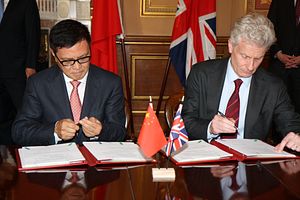If there is one striking characteristic of the U.K.-China relationship, it’s the lack of passion, despite all their historic and current overlays and links. When Li Keqiang visited Germany in September, he went shopping with Chancellor Angela Merkel in a supermarket. The two leaders actually seemed to get on with each other, with some evidence of personal chemistry. By contrast, on his visit to the U.K. visit in May, Li stood woodenly next to a nervous-looking Queen, who may have been resentfully wondering why a Chinese commoner had dared to demand an audience with her. The main issue in the lead up to Li’s May visit was an argument over the length of the literal red carpet rolled out for Li at the airport. It was almost as though Chinese protocol officers were mocking the U.K.’s perceived love of ritual and formality.
Hong Kong’s travails in recent days have only deepened this sense that the U.K. and China’s relationship lacks any sort of energy. Their dialogues resemble the worn out arguments between two partners who have known each other so long that their greatest challenge is managing their mutual weariness. British leaders stick to the parameters of “engagement” where they seek to “toughen up” on values and human rights issues at home while transforming into zealously single-minded infrastructure salesmen in China. China, meanwhile, smacks down any attempt by the U.K. to struggle onto its moral high horse by providing subtle (and not so subtle) reminders about London’s declining role in the world. Add in the dexterous reminders of the U.K.’s somewhat complex role in Chinese history, and on the whole we have a relationship that is workable but brittle and lacking in true warmth.
There is fault on both sides here, because things could be a whole lot better. The U.K. is still an amazing country of ideas, a place where there is a culture of embracing innovative and imaginative concepts. As a result, the U.K. is far more productive than one would expect based on its economic and population size. And for all its material power and money, China desperately needs ideas. The market for these is only likely to go up as Beijing tries to face some of its staggering environmental and sustainability challenges.
According to the stereotype, the British dislike emotion and passion. When it comes to diplomatic engagement with China, London seems determined to live up to this caricature. U.K. politicians file through Beijing, mouthing airy platitudes about “mutual benefit” and common understanding. They have done so for years. Every now and then members of the House of Lords comically start spouting Confucian clichés about “friends coming from afar.” They read from scripts written by their officials, and almost never wander off message.
In the last decade, Britain’s most senior diplomats serving in China have generally not sought emotional engagement with the country where they are stationed or the people they work with. Instead, they often behave as though such engagement is deeply contaminating and to be resisted. On the whole, officials are trained precisely not to think emotionally, especially in a country where there is always the shadow of a massive security threat. Elements of the British system remain deeply addicted to dealing with “threats” and privilege the management of perceived dangers above almost anything else.
Britain could do a lot better. Choosing a bolder political appointment as senior diplomat in Beijing would be one idea. Up till now, the post has gone to career diplomats. Another idea would be to try introducing some passion into the relationship. British people, after all, are not afflicted by forced emotional distance when they visit China and engage on a people-to-people level. They don’t on the whole equate appreciation of the achievements, aspirations, and ambitions of Chinese people with an act of national treachery. Intuitively, most British people do understand that China’s good fortune is also the world’s good fortune. And most of them seem delightfully immune to the terrifying shadows that some of their nation’s officials seem to see lurking everywhere.
The U.K. doesn’t need to be naïve about China, the difficulties it faces, and the challenges it poses for the outside world. But British officials need to do a far better job at utilizing the superb knowledge communities both in the U.K. and throughout Europe to help them with their work. Politicians in the U.K. need to grow out of the narrative of tepid engagement and hedging with China, and chose deeper collaboration and the achievement of common missions. There needs to be more fire and imagination in the relationship.
When we see a British politician well equipped by their officials standing up in China and the U.K., and consistently, coherently speaking with passion about the relationship, we’ll know things are moving forward at last. Yes, such a leader would have to endure the initial smirks and quizzical looks that would follow. But it’s better to smirk at a noble endeavor than to nod sagely at what turns out to be a busted flush. That’s the choice facing the U.K. in its relations with China today.

































